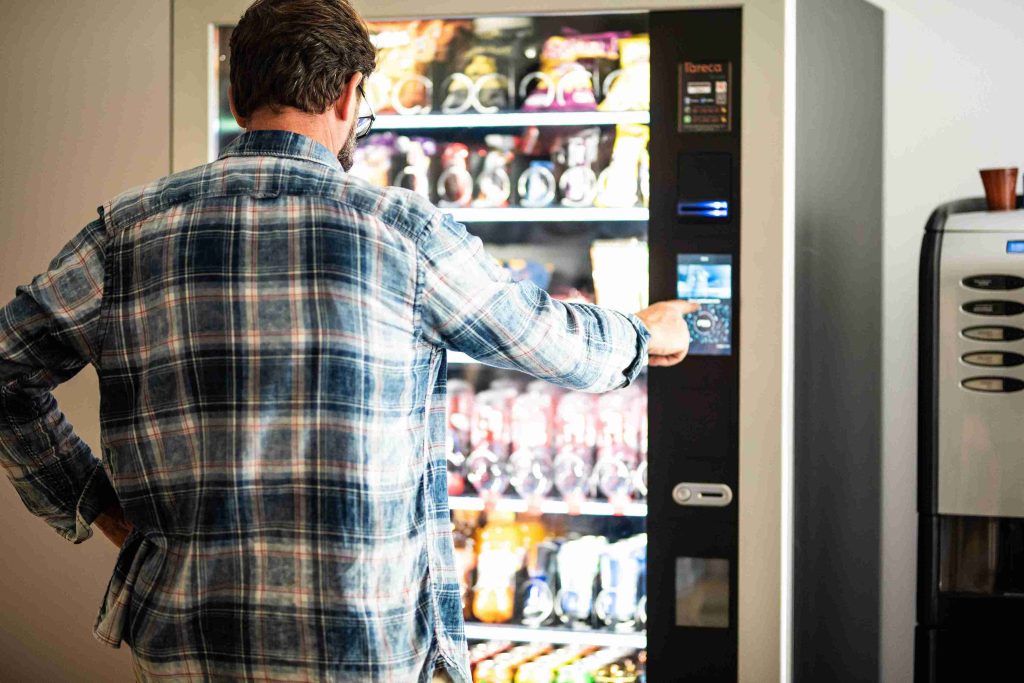In cities around the globe, vending machines have quietly transitioned from mere snack dispensers to intelligent, connected micro-retailers. While the outward changes are easy to spot—touchscreens, digital payments, even facial recognition—the true transformation is occurring behind the scenes.
One of the components that were previously ignored is taking center stage in this revolution; power supply. The old electric sources can no longer serve the needs of the current vending infrastructure. At the heart of this quiet energy shift lie innovative lithium batteries, making vending machines smarter, more versatile, and increasingly mobile.
The New Vending Machine: More than Snacks and Drinks
The coin-operated vending machines of yester years are a distant memory compared to the modern vending machine. These automated retailers that initially only sold soda and chips now sell items as diverse as electronics and cosmetics, prepared meals and medical supplies. In airports, train stations, and even rural areas, vending machines are offering essential goods where traditional stores cannot operate profitably or around the clock.
Smart vending systems are internet-based, monitor inventory, accept contactless and mobile payments and even analyze customer behavior. The machines are increasingly becoming a necessity in areas where convenience, speed and low cost of operation are of major concern. But all these new-fangled features require stable, efficient, and versatile energy sources, which the traditional power systems frequently cannot provide.
The Age of Smart Vending: Power Challenges:

As vending machines have become more advanced, their energy demands have grown accordingly. Such components as high-resolution LCD screens, cooling or heating systems, Wi-Fi modules, surveillance cameras, and complicated internal motors all require a substantial amount of electricity. In traditional installations, vending machines are tethered to the grid, often using bulky, inefficient lead-acid batteries for backup or off-grid scenarios.
This arrangement brings in several constraints. Grid dependency limits the flexibility of placement, especially in outdoor or remote places. Loss of power may break services and spoil perishable goods. Moreover, legacy batteries have a low discharge capacity, have a short lifespan and take a long time to charge. Such limitations are operational risks and limit the potential of smart vending.
The necessity of a more efficient, durable, and flexible energy solution has never been as clear. Enter the age of innovative lithium batteries that are engineered to meet modern energy challenges with unmatched performance.
Lithium Battery Technology: A New Energy Backbone
Lithium battery technology has become a cornerstone of modern electronics, and its adoption in vending machines is proving just as transformative. Lithium batteries have a much greater energy density compared to conventional power sources, so a battery can operate longer on a single charge without having to increase the physical size of the battery pack.
In addition, lithium batteries last longer and usually can last over 2,000 complete charge-discharge cycles, depending on the system. This durability is reflected in low maintenance costs and service interruptions that are important to vending operators who operate in various locations.
Notably, lithium batteries are compatible with rapid charging. This feature allows fast turn arounds of mobile vending units and reduces the downtime in fixed machines. They are also more mobile due to their lightweight, which gives them the possibility of deployment in places where grid power supply is unreliable or scarce.
Lithium battery adoption is not only advantageous but also becoming a necessity to vending businesses that want to scale their operations effectively.
Innovations in Lithium Batteries That Matter to Vending Tech:
Even the core lithium-ion cell has undergone radical changes in recent years. New chemistries like lithium iron phosphate (LiFePO 4 ) and lithium titanate (LTO) are safer, more thermally stable and have a longer lifecycle, and are especially well-suited to vending applications that are exposed to wide temperature ranges or are continuously in use.
Moreover, the incorporation of high-end Battery Management Systems (BMS) guarantees the best performance. The BMS technology prevents overcharging, overheating, and deep discharges. This may damage the battery and cause safety hazards. The ability to monitor the battery status in real-time enables the operators to monitor the battery status remotely, which fits the data-centric smart vending infrastructure perfectly.
The other breakthrough technology is the solid-state battery. This topic is becoming a topic of interest due to its high energy density and safety. Although not yet widely commercialized, solid-state lithium batteries promise a leap forward in compact energy storage. This makes it possible for vending machines to operate autonomously for extended periods without sacrificing performance.
Such innovations are not only enhancing the operational resilience of vending machines but are also setting the stage for a broader shift toward decentralized, self-sustaining retail technologies.
Future Prospects: Autonomous, Solar, and Mobile Vending Units
As lithium battery innovations continue to mature, the possibilities for vending machines are expanding beyond fixed, plug-in units. Mobile vending machines that are powered by battery systems are now feasible for deployment at festivals, parks, campuses, and even construction sites. These units are transportable and can be activated immediately and do not need permanent infrastructure.
In addition, the combination of lithium-powered systems and solar energy enables full off-grid operation. In regions with limited electricity access or frequent outages, solar-integrated vending machines provide continuous service while aligning with environmental sustainability goals.
Moreover, the vending systems that take advantage of lithium power allow autonomous restocking and data synchronization.
The combination of automation in vending and the engineering of the lithium battery is paving the way to the self-sustaining, intelligent retail kiosk. They are capable of operating in unreliable environments, cutting down on the cost of operation, and delivering services to underserved regions, with minimal environmental damage.
Conclusion:
The vending machine business is undergoing a phenomenal change-the transition between the static snack dispensers to the intelligent, flexible and frequently mobile retail systems. This development is closely connected with energy technology development. The incorporation of innovative lithium batteries is enabling machines to operate independently, adapt to modern retail demands, and function efficiently in locations where traditional infrastructure falls short.
As vending machines become integral to urban logistics, remote services, and contactless commerce, lithium battery innovations will continue to power their progress—quietly but crucially. The humble convenience has now turned into the foundation of smart retail, and the force behind it is more advanced than ever.




